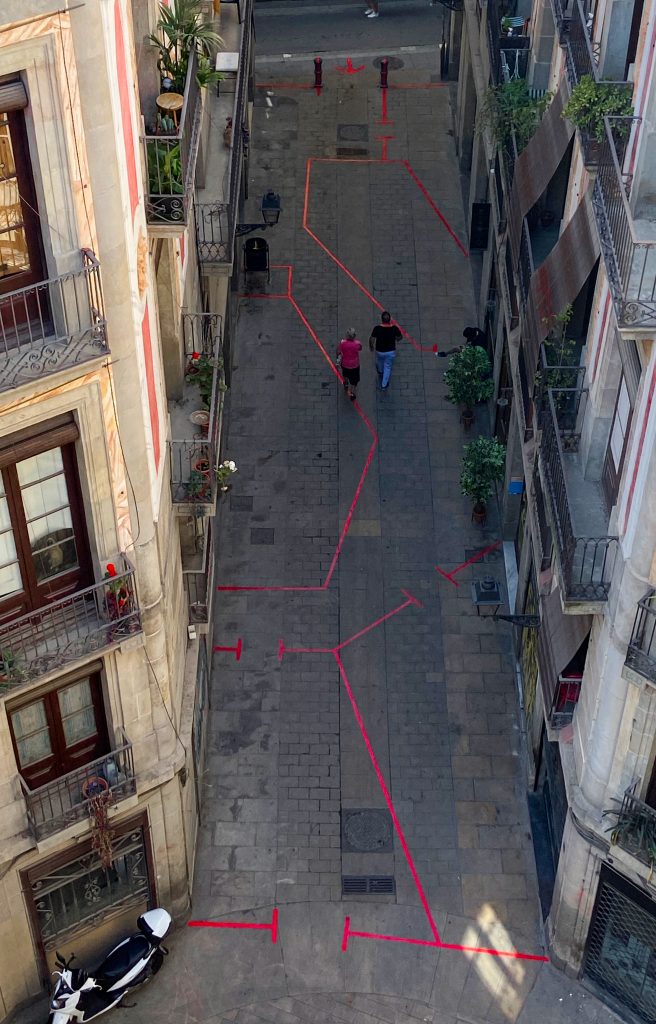Bodybuilder
An exploration of body cult society
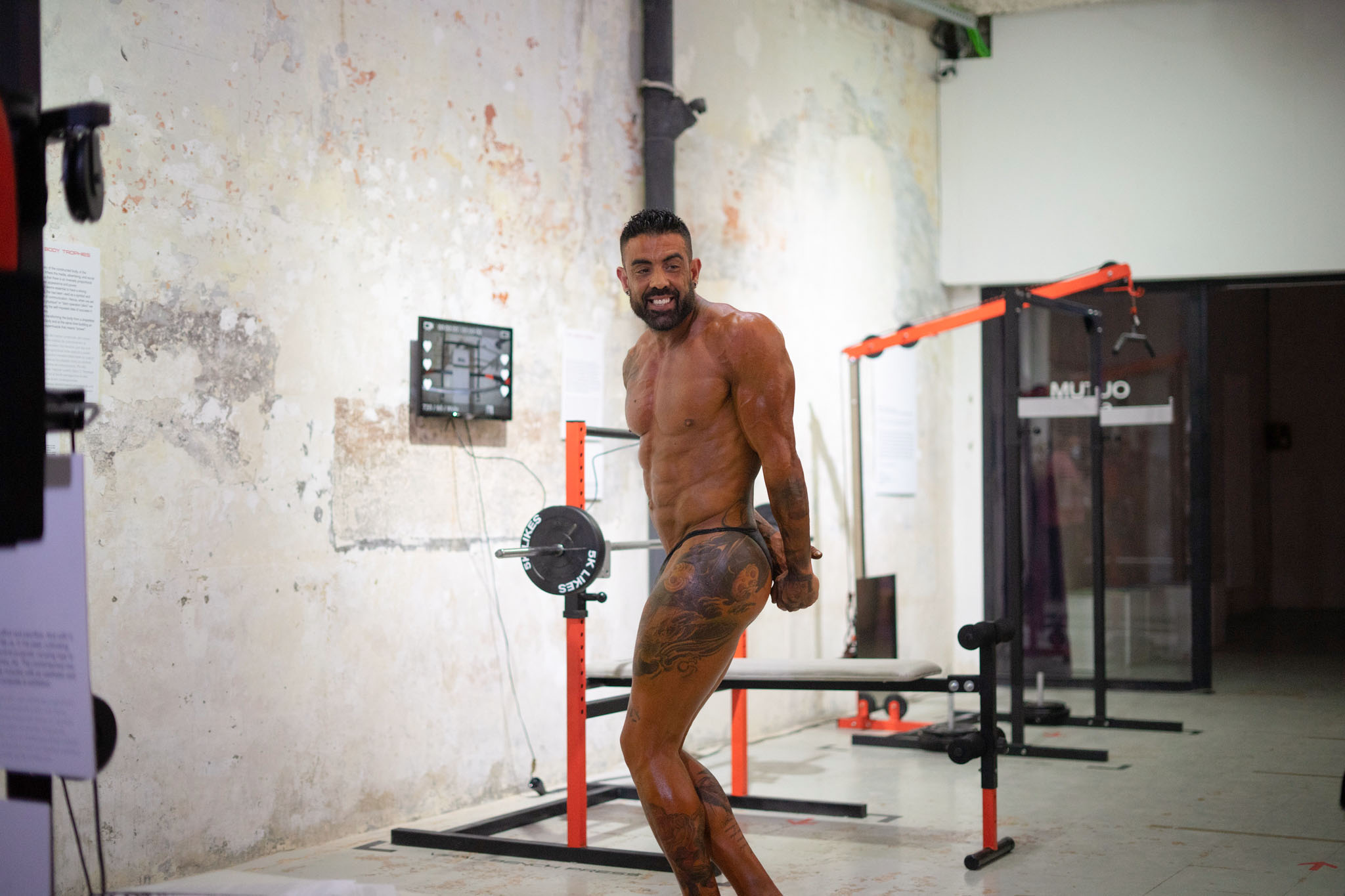

We live in a “fit” society, where gyms are temples of transformation towards a globalized stereotype. The cult of the body plans and controls our daily routines and ends up shaping our identity, fueling the fitness industry, which is only growing.
At the same time we are in the age of information, of data; it is said that having information is power, and we can apply it to this fitness paradigm as well. We design our body in gyms by entering data (15 repetitions of squats for 3 sets, 100 grams of rice…) para construir el cuerpo ideal and at the same time gain individual power. The beauty acaba siendo algo measured, weighed, equated, and compared.
The bodies that visualize this in the most extreme way are body-builders. Mass body, corporal and data body, representing a bodily ideal of power. We all see this social group as far from our reality, but the body-builders of the past are the fitness followers of the present.
Sport today has become a complex commercial, political and social activity, where the healthy body is confused with the aesthetic body, moulding the canons of beauty and our self-esteem at will. And the way we get entangled is by following these data rituals.
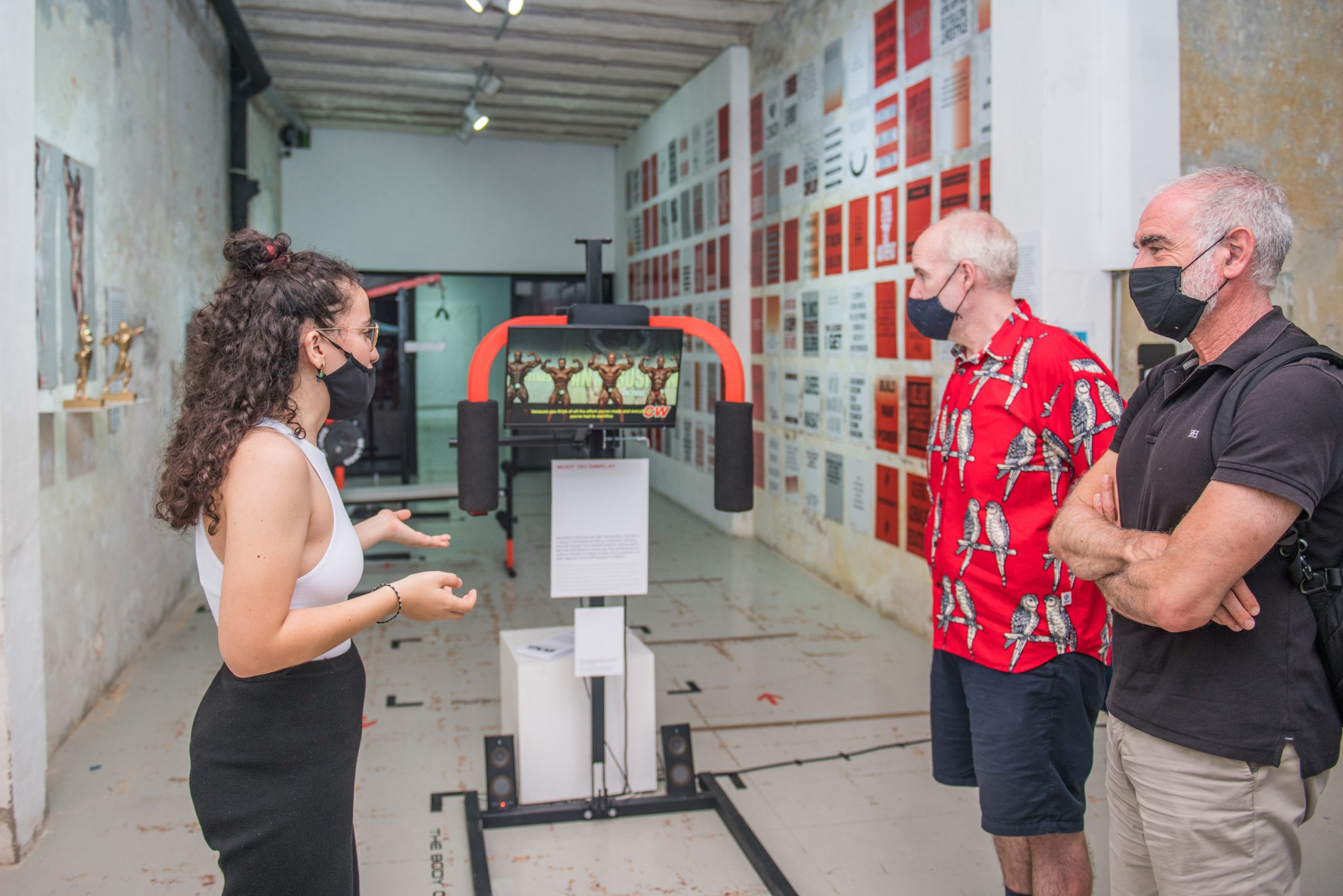
Body on display
We exhibit a body built with effort and sacrifice. And with it, a feeling of self-satisfaction fills us. In the past, cultivating muscular strength had a practical purpose: carrying logs to light fires, defending our homes, etc. The contemporary era works on strength to enlarge muscles with an aesthetic and static objective, whose sole purpose is exhibition.
“How does it feel to get on the platform as a bodybuilder?”
The audio corresponds to the testimony of my own gym trainer.
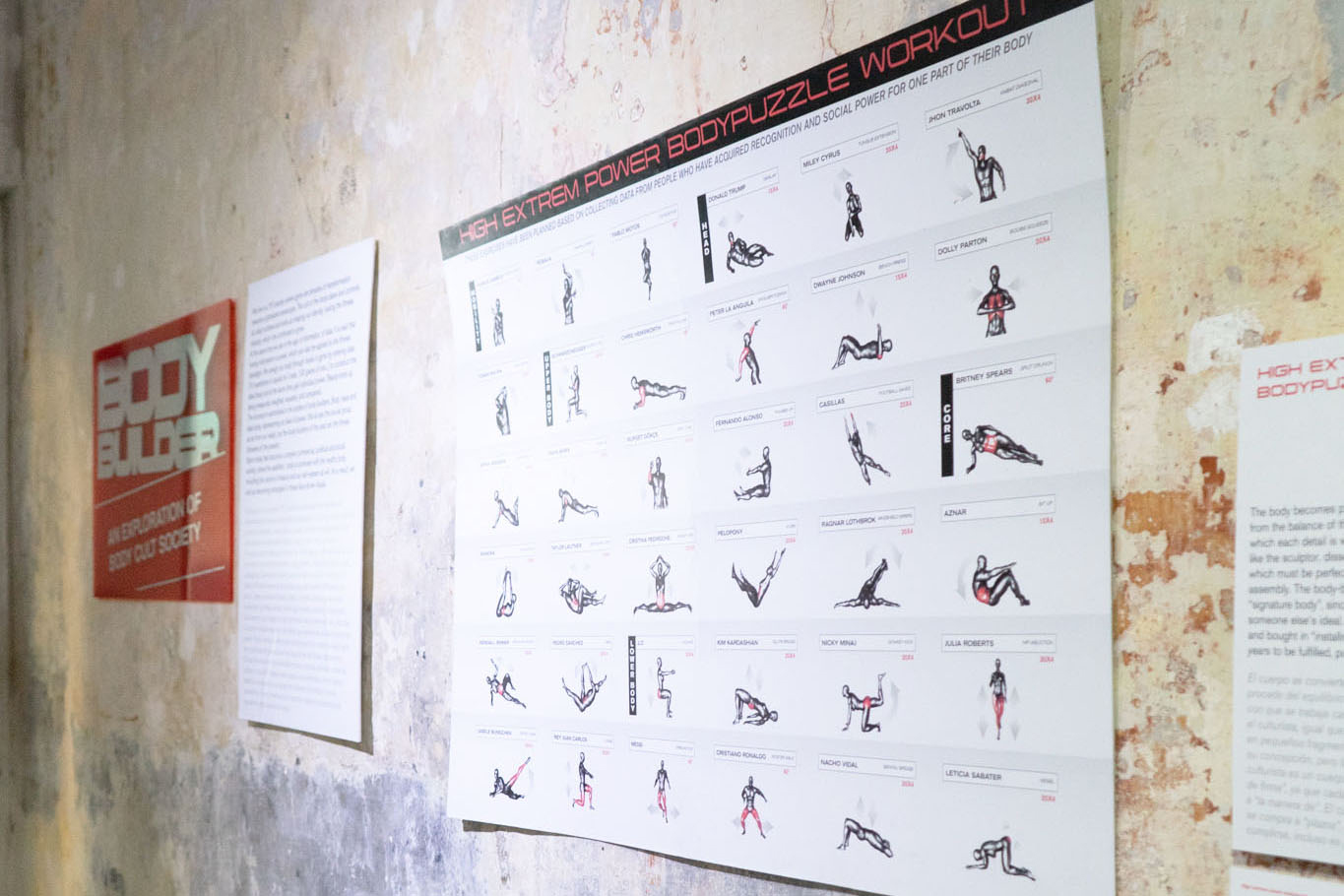
High extreme power bodypuzzle workout
The body becomes proportions, the classical beauty comes from the balance of the parts, from the perfect measure with which each detail is worked. Therefore, the bodybuilder, like the sculptor, dissects the body into small fragments, which must be perfect in their conception, but also in their assembly. The body-builder is a body-puzzle; but also a “signature body”, since each of its fragments is molded “in the manner of”. The perfect body is sold in “pieces” and bought in “installments”, and some of these will take years to be fulfilled, possibly never even achieved.
We follow body references to transform our body, and most of them end up being the celebrities we see in the media. This routine has been created by collecting data from people who have acquired social power and have become referents thanks to a part of their body. This survey has been conducted on instagram and in gyms where they have given us these answers.
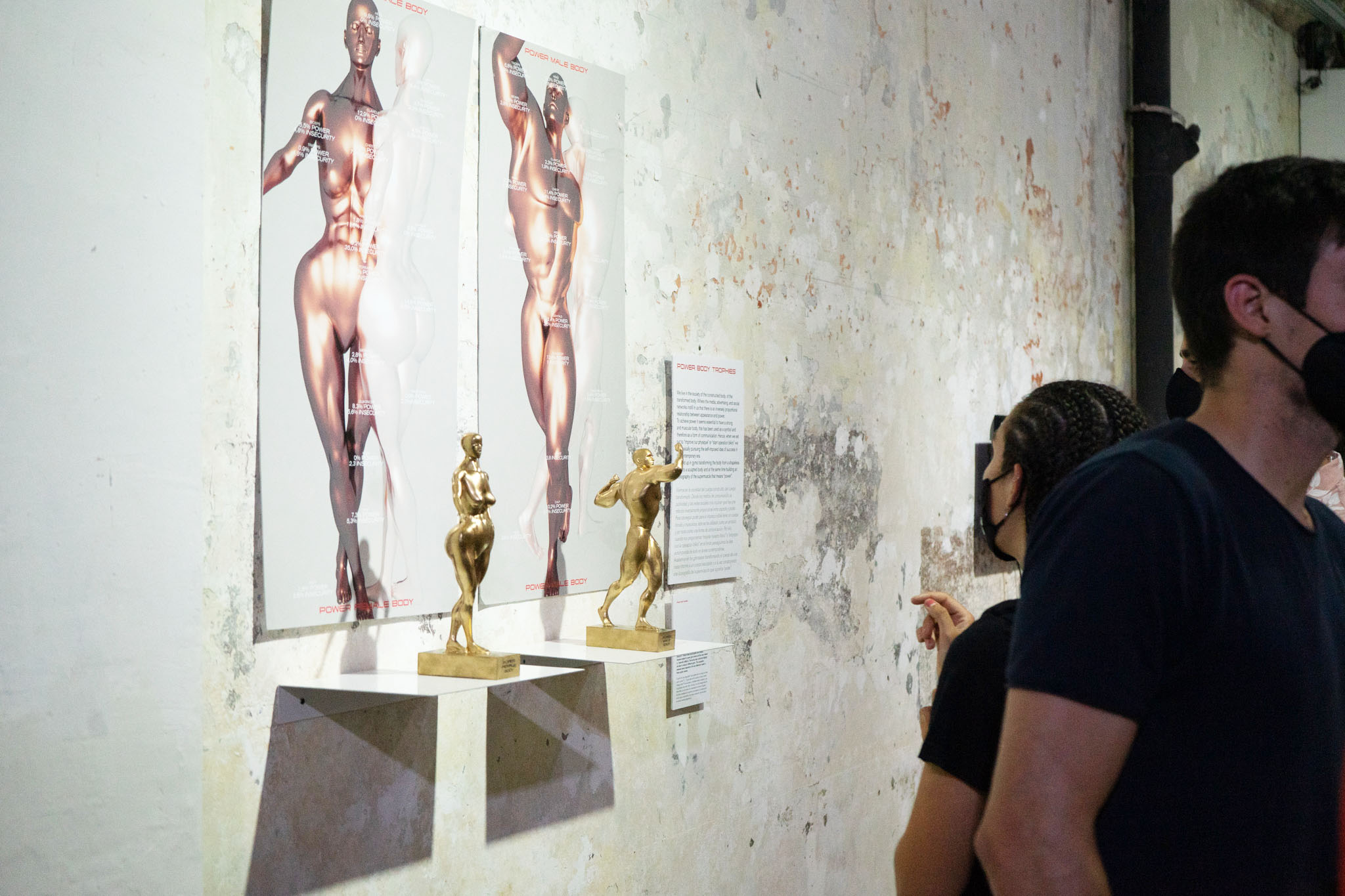
Data power trophies
We live in the society of the constructed body, of the transformed body. Where the media, advertising, and social networks instill in us that there is an inversely proportional relationship between appearance and power.
To achieve power it seems essential to have a strong and muscular body, this has been used as a symbol and therefore as a form of communication. Therefore, when we set out to “improve our physique” or “start operation bikini” we are basically pursuing the self-imposed idea of success in the contemporary era.
We end up in gyms transforming the body from a shapeless mass to a sculpted body and at the same time building an iconography of the supermuscle that means “power”.
From the question “what part of your body makes you feel empowered?” and “what part of your body makes you feel insecure?” These bodies are sculpted and molded. Power answers give volume and insecurity answers deflate it. The survey was conducted digitally and also analogically in different gyms . The separation between sexes responds to the very distinction made in these sports centers.
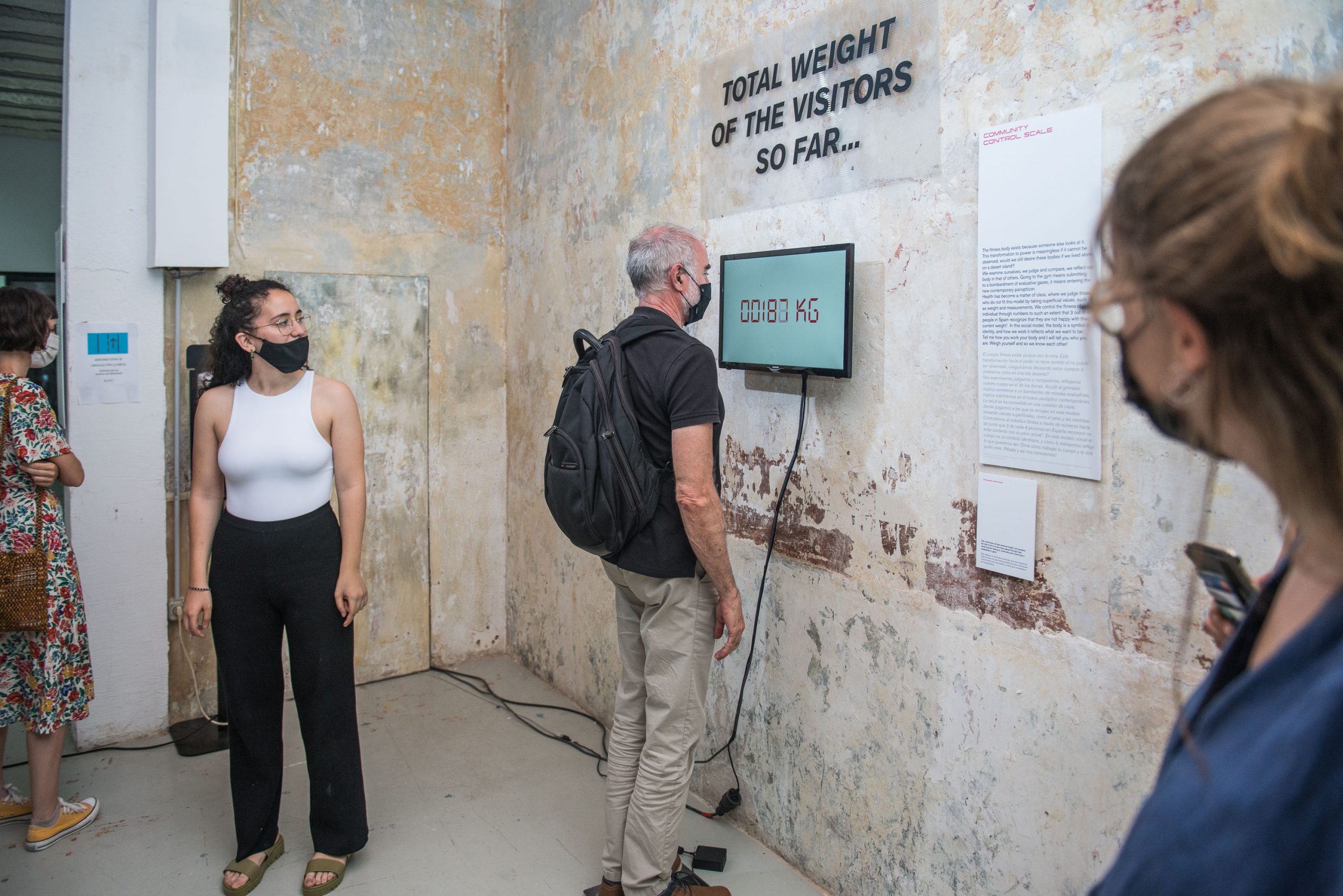
Community control scale
The fitness body exists because someone else looks at it. This transformation to power is meaningless if it cannot be observed, would we still desire these bodies if we lived alone in the world?
We examine ourselves, we judge and compare, we reflect our body in that of others. Going to the gym means submitting to a bombardment of evaluative gazes, it means entering the new contemporary panopticon.
Health has become a matter of class, where we judge those who do not fit this model by taking superficial values, such as weight and measurements. We control the fitness individual through numbers to such an extent that 3 out of 4 people in Spain recognize that they are not happy with their current weight. In this social model the body is a symbol of identity, and how we work it reflects what we want to be:
Tell me how you work your body and I will tell you who you are. weigh yourself and so we know each other!
This scale does not give the personal weight, but visualizes the total of all of us who have passed through here, reinforcing the feeling of community and control that is established in gyms.
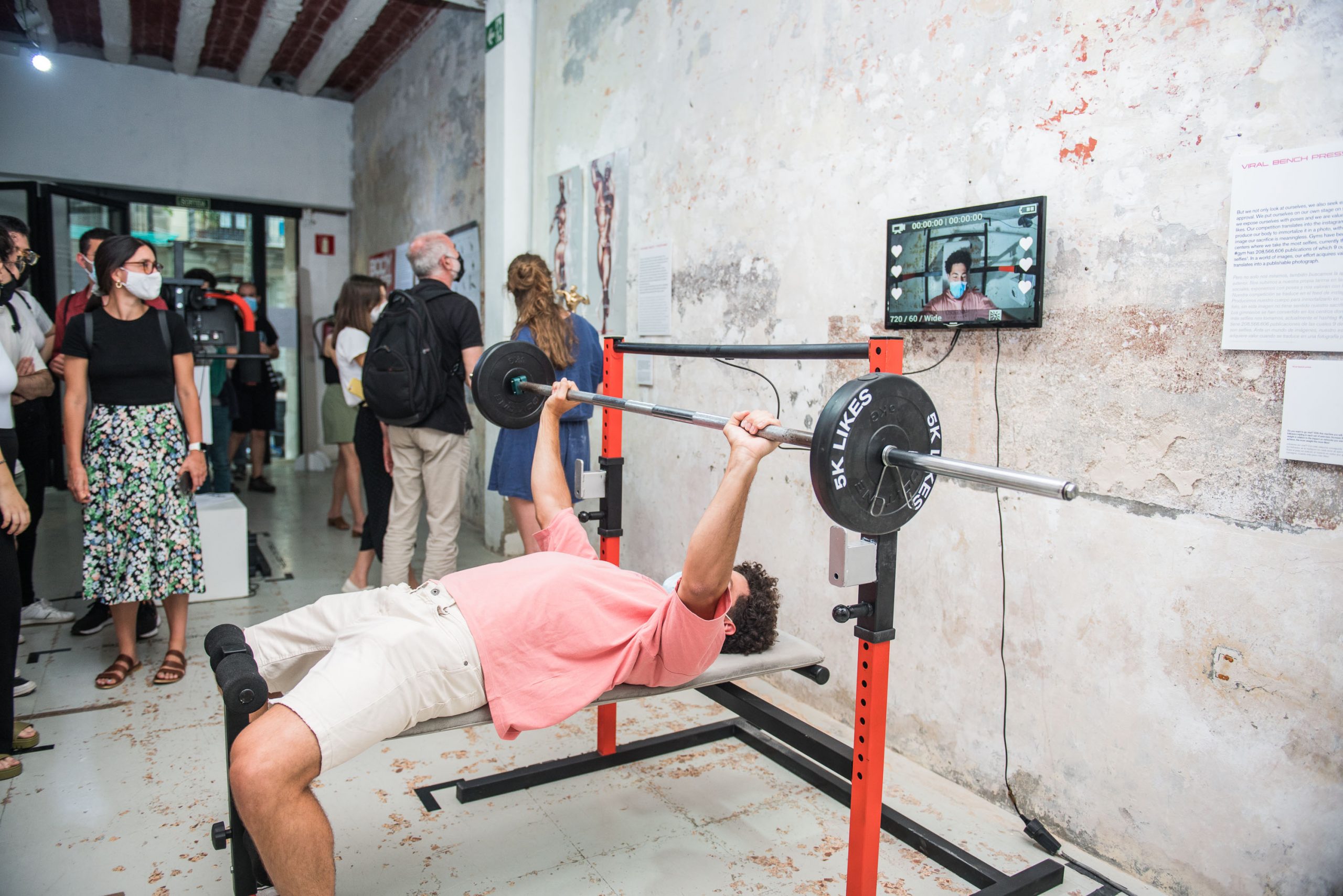
Viral bench press
But we not only look at ourselves, we also seek external approval. We put ourselves on our own stage on social media, we expose ourselves with poses and we are valued with likes. Our competition translates into the instagram feed. We produce our body to immortalize it in a photo, without this image our sacrifice is meaningless. Gyms have become the centers where we take the most selfies, currently the hashtag #gym has 208,566,606 publications of which 9 out of 10 are selfies. In a world of images, our effort acquires value when it translates into a postable photograph.
Do you want to go viral? With this machine you will get followers tripling in each set of exercises. Increase the weight in relation to the impact on networks you want to achieve, the more weight the more likes!
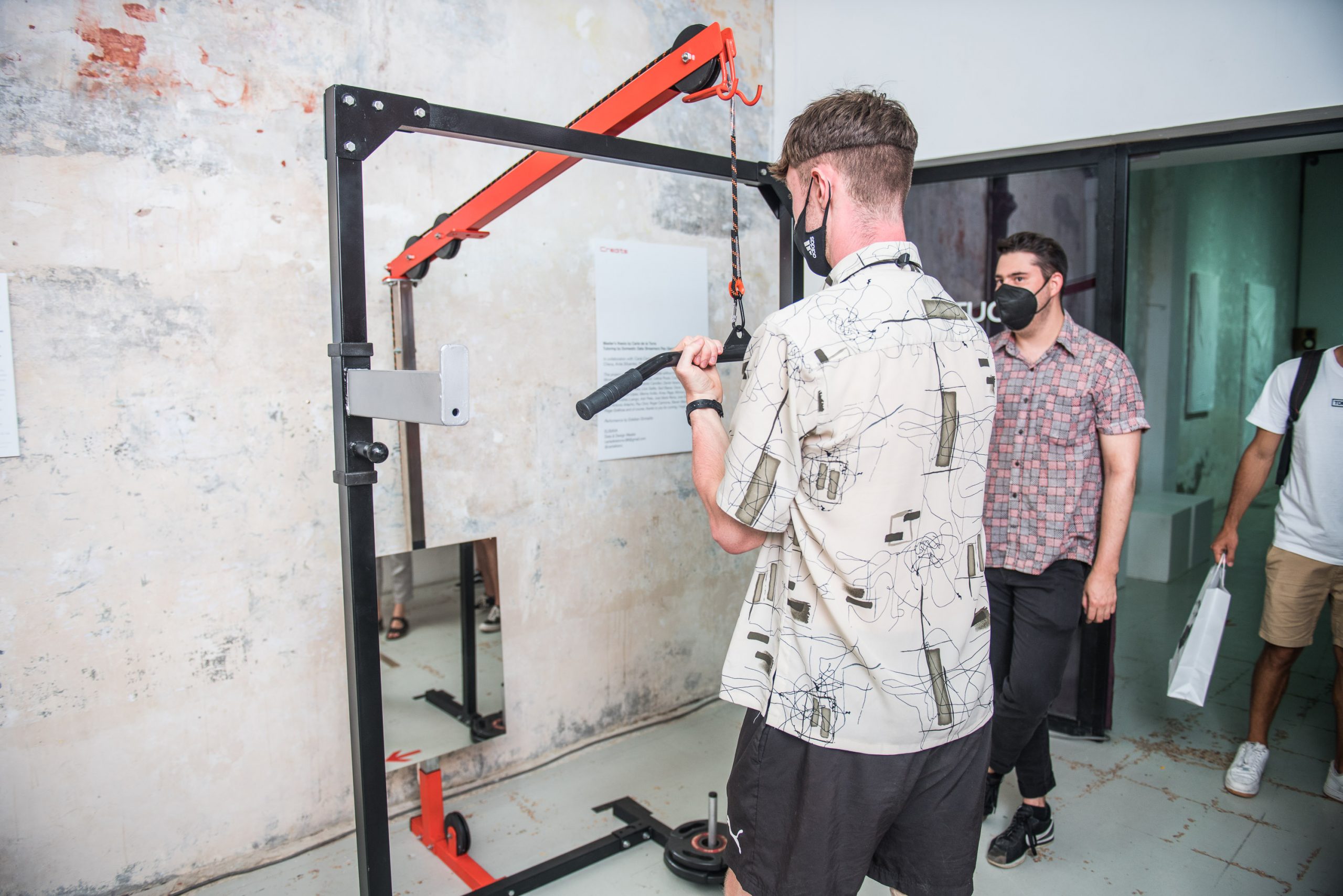
Narcissus machine
But in gyms we not only observe each other, we spend most of the time looking at ourselves and seeking our own approval: we are in the age of egoism and the continuous cult of the ego.
In the mirrors we design the ego as if we were sculptors, we use the data to know how to gain volume or to reduce it. We gain power in each set, in each repetition, we increase the weight…. We calculate our movements to produce the image we want to be, following the same laws that govern consumption: immediacy and utility.
Currently 30% of Spaniards claim to control the portions they eat, counting calories and 71% follow fitness routines daily from their smartphone. Now, Narciso has not only fallen in love with his image, but has produced it, needing to show it off.
The Narcissus machine allows you to work on the cult of the body and the cult of the ego in unison. Don’t stop looking at yourself while you think about who you want to be!
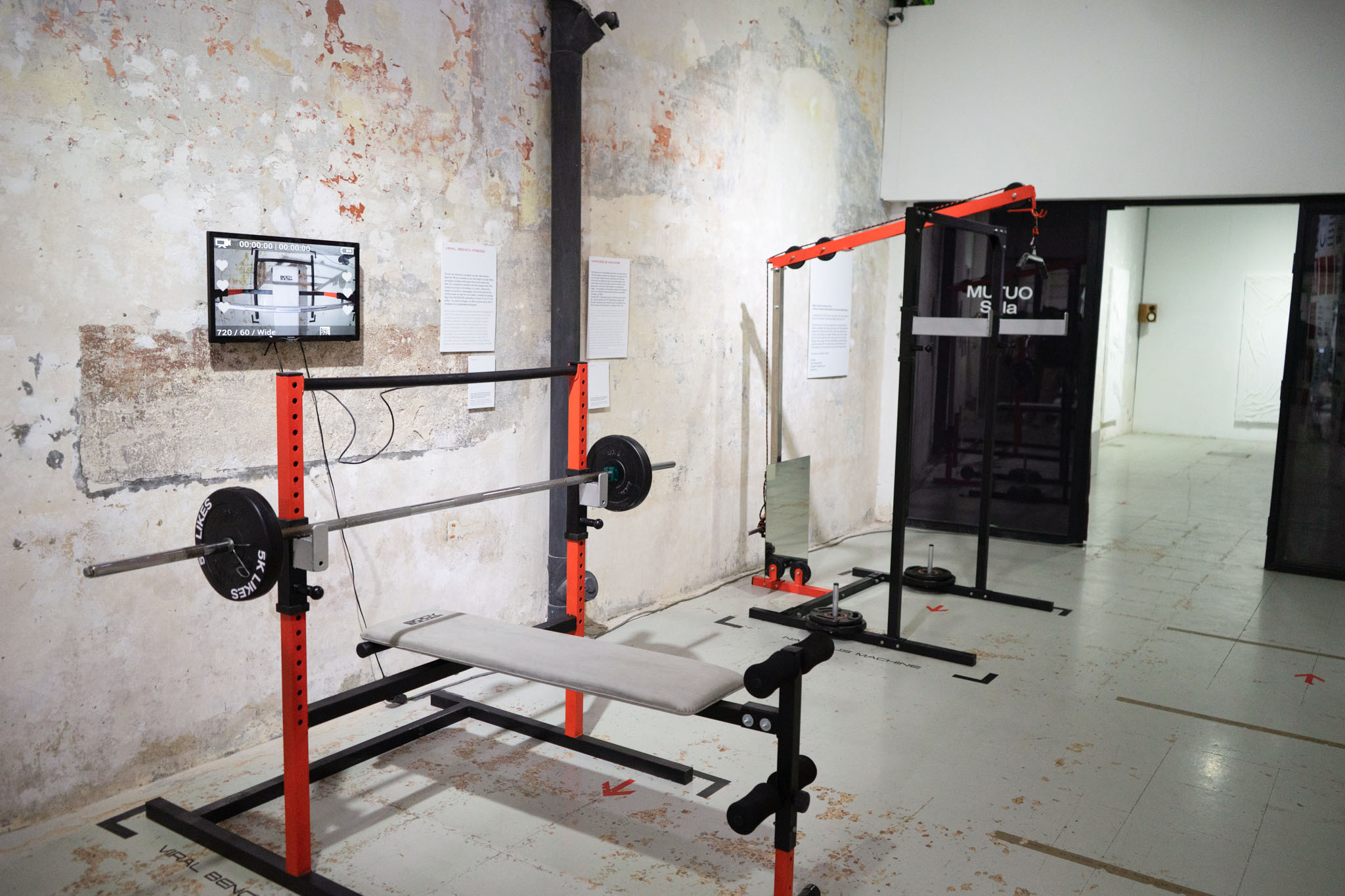
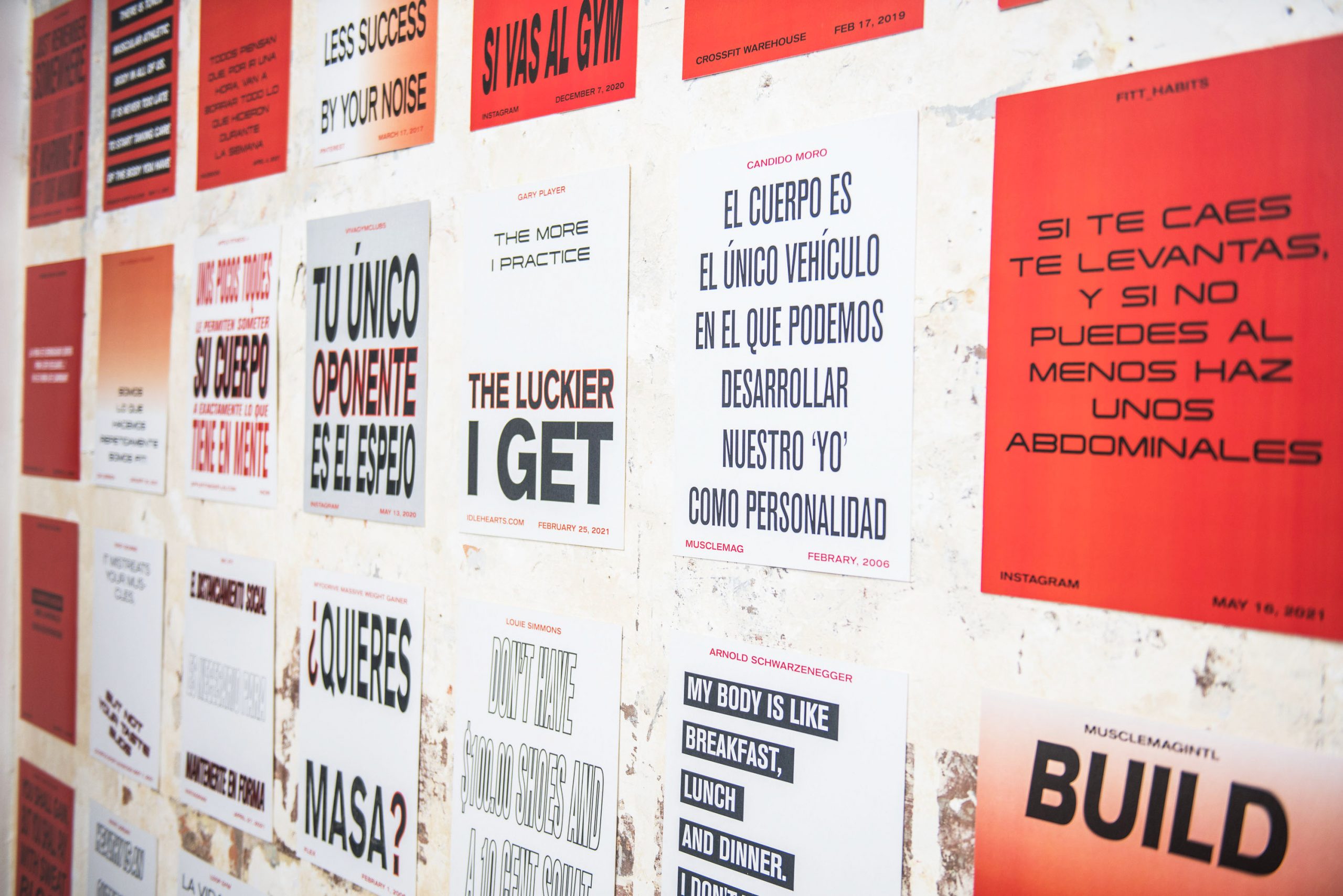
Prayers for the mass fitness
In Spain, there are more than 4,000 sports facilities operating and generating a business of 2,291 million euros. Currently there are more than 5.5 million users registered in gyms, five times the number of users registered in soccer clubs. On youtube there are more than 30 million fitness videos and the #fittok challenge on Tiktok has more than 2 trillion repetitions that not even in 900 thousand years would we finish watching it all. A huge community has been built that communicates through magazines, social networks, blogs and gyms. We have become accustomed to a bombardment of messages that are far from the healthy sense of sport and that we have already normalized, creating a whole moral imaginary. We want to stand out from the crowd and achieve self-confidence, but we actually end up becoming a mass.
This mass inhabits gyms, and they have become the new temples where people go in search of disconnection, peace and pleasure. Places where talking seems to be forbidden and where healthy image has become a divine principle. We follow routines where personal sacrifice translates into sweat and time, with highly programmed rituals with the desire for constant self-improvement; we separate food between “pure”, like tuna rice, and “impure”, like pizza; we look for “high protein” or “no sugar added” as gospels in our supermarkets; and then we end up blinded in a bodily hedonism, but does this effort really produce a more satisfying life? Welcome to the new contemporary religion: We are bodybuilders.
Body cult messages are instilled in us daily as if they were prayers. These 120 are real messages from magazines, instagram accounts, workout websites and gyms that make us question the role of personal freedom over the body.


